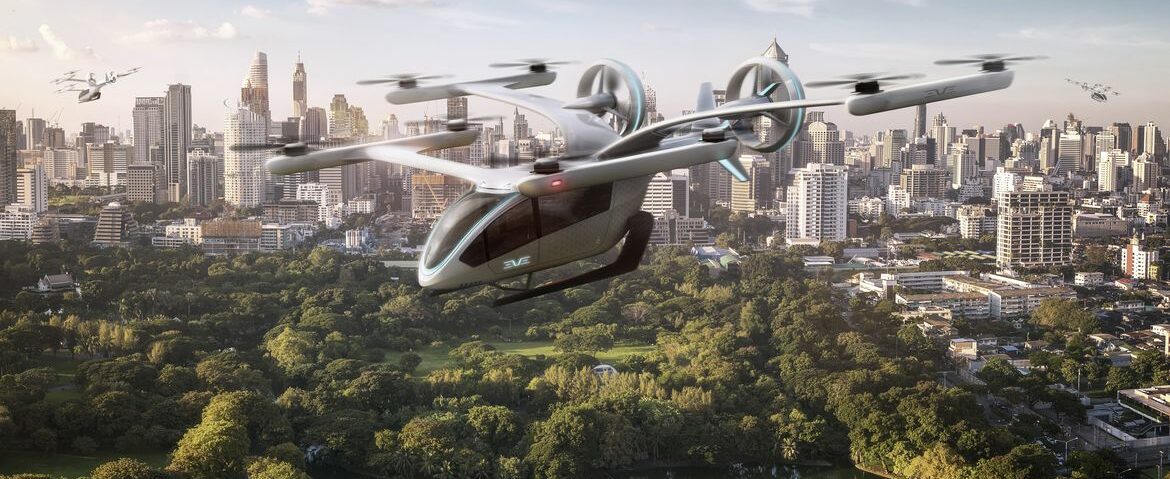
For decades sci-fi movies have been nurturing our dreams of taking off to the skies, escaping the terrestrial and mundane traffic, in silent and gleaming flying cars.
While optimists and visionaries have long seen this leap in urban mobility coming, for many of us it seemed like a far away future. Until recently. The Brazilian aircraft manufacturer Embraer has announced in the end of the second quarter of 2021, that it has sold a total of 250 eVTOLs, which is short for electrical vertical take-off and landing vehicles. Embraer already showed the world their eVTOL prototype’s test flight in April this year and the pre-order of international mobility companies showed the market’s interest, growing infrastructure and a silver lining for the city of the future. A future that we could witness already within 5 years from now.
The deal was signed by Eve Urban Air Mobility Solutions, a division of the Brazilian company Embraer focused on the ecosystem of urban air mobility with helicopter operators in the United States, United Kingdom and Brazil. Within five years, futuristically designed electrically-powered aircraft capable of taking off and landing vertically, like helicopters, could be seen in the skies of major global cities. This, at least, is Eve’s expectation. In the first days of June, the company announced partnerships with the Brazilian company Helisul Aviation, one of the largest helicopter operators in Latin America, and with Halo, a company with a strong presence in the air cab and helicopter charter markets in the United States and the United Kingdom.
The two agreements provide for the sale of a total of 250 eVTOLs of which 200 will go to Halo and 50 to Helisul. If all goes according to schedule, the first aircraft will be delivered in 2026. Halo disclosed that it plans to operate its fleet of flying cars in London and New York. Helisul’s vehicles should be used in large Brazilian cities like São Paulo, which currently holds the world’s largest helicopter fleet.
The deal with Halo is the largest order for eVTOLs ever made. The transaction did not have its value disclosed, nor was it clear whether Eve, whose headquarters are in Melbourne, Florida (USA), received any advance payment as guarantee of the sale. In a statement to the market, Halo said it chose Eve’s vehicles after evaluating about a dozen eVTOL projects. The partnership with Helisul, announced less than a week later, provides, in addition to ordering the aircraft, the creation of a strategy for preparing the urban air mobility ecosystem (UAM) in Brazil. Eve and Helisul are already working together to create UAM solutions taking advantage of the existing air cab infrastructure in Brazil, one of the largest on the planet.
There is currently a global race for the development of these aircraft, pointed out by some experts as a possible alternative to reduce traffic congestion and improve air quality in large cities. Besides Embraer, several aeronautical companies, technology companies and car factories, such as Airbus, Uber, Google and Toyota, have eVTOLs projects in progress. After all, the long-desired dream of escaping traffic by launching vertically into the sky might not be as futuristic anymore as we might have thought.
Image copyright owned by Embraer.